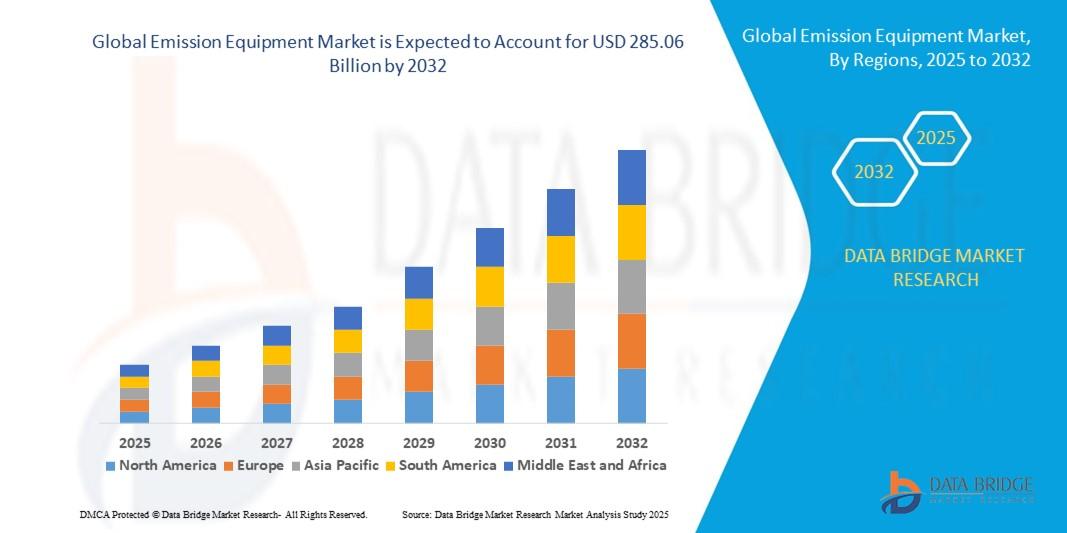How Industrial Modernization Is Transforming the Emission Equipment Market Landscape

Emission Equipment Market Overview
The Emission Equipment Market Size is witnessing strong growth driven by the increasing implementation of environmental regulations, the global push toward decarbonization, and the need for efficient air pollution control systems. In 2024, the market was valued at around USD 157.47 billion and is projected to reach USD 285.06 billion by 2032, expanding at a CAGR of 7.70% during the forecast period.
Emission control equipment plays a crucial role in reducing harmful pollutants and greenhouse gas (GHG) emissions generated by industrial processes, vehicles, and power generation units. These systems—comprising filters, scrubbers, catalytic converters, and electrostatic precipitators—are essential for maintaining air quality standards and regulatory compliance across industries such as manufacturing, automotive, oil & gas, and energy.
Competitive Landscape for Emission Equipment Market
The Emission Equipment Market is moderately consolidated, featuring a mix of global and regional players focusing on innovation, partnerships, and compliance-based solutions. Companies are Babcock & Wilcox Enterprises, Inc. (U.S.), Mitsubishi Hitachi Power Systems, Ltd. (Japan), General Electric Company (U.S.), Alstom SA (France), Siemens AG (Germany), Doosan Heavy Industries & Construction Co., Ltd. (South Korea), Thermax Limited (India), ANDRITZ AG (Austria), Johnson Matthey PLC (U.K.), Amec Foster Wheeler (U.K.)
Key Market Drivers
- Stringent Environmental Regulations
Governments worldwide are enforcing strict emission norms to curb industrial pollution. Regulations like EU Emission Standards, U.S. Clean Air Act, and India’s National Clean Air Programme (NCAP) are compelling industries to adopt advanced emission control technologies. - Rising Focus on Industrial Air Quality
Increasing public health awareness and corporate responsibility toward sustainability are driving industries to invest in air pollution control systems, especially in cement, steel, chemical, and power generation sectors. - Growth in Automotive Emission Control
With the implementation of Euro 6, BS-VI, and EPA emission norms, there has been a surge in the adoption of catalytic converters, diesel particulate filters (DPF), and exhaust gas recirculation (EGR) systems in vehicles to reduce NOx and particulate emissions. - Expansion of Renewable and Clean Energy Technologies
While fossil fuels still dominate power generation, there is a growing shift toward low-emission technologies. Many power plants are upgrading existing systems with flue gas desulfurization (FGD) and selective catalytic reduction (SCR) equipment to comply with emission limits. - Technological Advancements and Innovation
Continuous improvements in sensor technology, IoT-based monitoring, and hybrid emission systems are enhancing performance and efficiency, enabling industries to track and control emissions in real time.
Emission Equipment Market Segmentation
By Type:
- Catalytic Converters
- Diesel Particulate Filters (DPF)
- Electrostatic Precipitators (ESP)
- Flue Gas Desulfurization (FGD) Systems
- Selective Catalytic Reduction (SCR) Systems
- Others
By Application:
- Automotive
- Power Generation
- Oil & Gas
- Manufacturing
- Chemicals & Petrochemicals
- Marine
- Others
By End User:
- Industrial Facilities
- Transportation
- Energy & Utilities
- Residential and Commercial
Among these, the power generation and automotive sectors dominate the market due to stringent global emission standards. Meanwhile, the manufacturing and oil & gas segments are expected to record significant growth, driven by modernization and sustainability initiatives.
Regional Insights for Emission Equipment Market
North America:
North America holds a major emission equipment market share, led by the U.S., where regulatory frameworks like the EPA’s Clean Air Act and heavy industrial presence have accelerated the adoption of emission control systems. The region also benefits from technological innovation and high investments in clean energy and carbon reduction projects.
Europe:
Europe remains a global leader in environmental protection policies. The EU Industrial Emissions Directive and carbon neutrality goals have prompted industries to deploy advanced emission monitoring and reduction systems, especially in Germany, France, and the UK.
Asia-Pacific:
Asia-Pacific is expected to exhibit the fastest growth during the forecast period, driven by rapid industrialization in China, India, and Southeast Asia. Increasing government pressure to reduce air pollution and the expansion of manufacturing and power sectors are fueling market demand.
Latin America:
Steady growth is seen in Brazil and Mexico, supported by industrial expansion and gradual implementation of emission control norms.
Middle East & Africa:
The region is investing in clean technologies and refinery upgrades to reduce emissions, particularly in Saudi Arabia, UAE, and South Africa, aligning with regional sustainability goals.
Emerging Opportunities in Emission Equipment Market
- Adoption of Carbon Capture and Storage (CCS): Growing interest in integrating CCS with emission control systems for large-scale pollution reduction.
- Retrofitting of Existing Plants: Upgrading old industrial setups with modern emission equipment to meet compliance requirements.
- Growth in Hydrogen and Bioenergy Projects: Increasing demand for emission control in renewable fuel production facilities.
- Green Infrastructure Development: Rising investments in low-emission building materials and urban air purification systems.
- Technological Partnerships: Collaboration between equipment manufacturers and IoT solution providers for smart monitoring integration.
Challenges and Future Outlook
The long-term outlook for the Emission Equipment Market remains highly favorable. With tightening environmental standards, the global focus on decarbonization, and ongoing technological advancements, the industry is expected to experience sustained growth. Future developments in carbon capture integration, AI-driven emission monitoring, and next-generation catalytic materials will further strengthen the market’s role in achieving global clean air and sustainability goals.
Despite positive market prospects, challenges such as high installation costs, complex maintenance, and lack of skilled workforce may limit growth in certain regions. Additionally, economic fluctuations and supply chain constraints can affect equipment production and deployment.
For More Reports
Television (TV) Analytics Market
Wireless LAN Controller Market
About Us:
Data Bridge is one of the leading market research and consulting agencies that dominates the market research industry globally. Our company’s aim is to give clients the knowledge they require in order to function in changing circumstances. In order to give you current, accurate market data, consumer insights, and opinions so that you can make decisions with confidence, we employ a variety of techniques, including surveys, video talks, and focus groups around the world.
Contact :
Data Bridge Market Research Private Ltd .
3665 Kingsway — Suite 300 Vancouver BC V5R 5W2 Canada
+1 614 591 3140 (US)
+44 845 154 9652 (UK)
- Art
- Causes
- Crafts
- Dance
- Drinks
- Film
- Fitness
- Food
- Giochi
- Gardening
- Health
- Home
- Literature
- Music
- Networking
- Altre informazioni
- Party
- Religion
- Shopping
- Sports
- Theater
- Wellness


